Some of our latest findings...
Americans Anticipate Hotter Future While Weighing Weather Stability in Relocation Decisions
The latest SPEER surbey reveals that Americans largely expect more extreme heat in the coming years, with 67% of respondents believing hotter temperatures and heat waves will occur more frequently over the next five years.
The survey shows a stark contrast in how Americans perceive different climate threats. While expectations for increased heat are dominant, perceptions about other weather events are more divided. For cold weather, opinion is split - 27% expect less frequent cold temperatures and winter storms, while 35% anticipate more. Similarly, for excessive rainfall and floods, 20% predict decreases while 42% expect increases.
When it comes to potential relocation due to severe weather, Americans are divided: 32.5% of respondents indicate they would be either somewhat or very likely to move to a different part of the country within five years due to severe weather events if other constraints weren't a concern. However, a larger portion (49.3%) consider such a move unlikely.
Looking further into the future, weather stability appears to be a significant consideration in long-term location decisions. An overwhelming 82.2% of respondents rate stable, predictable weather as moderately to extremely important when considering where they might live in the next 10-20 years, with nearly 30% ranking it as "extremely important."
These findings suggest that while Americans have mixed perspectives on immediate weather-related migration, climate considerations are becoming an increasingly important factor in long-term residential planning.
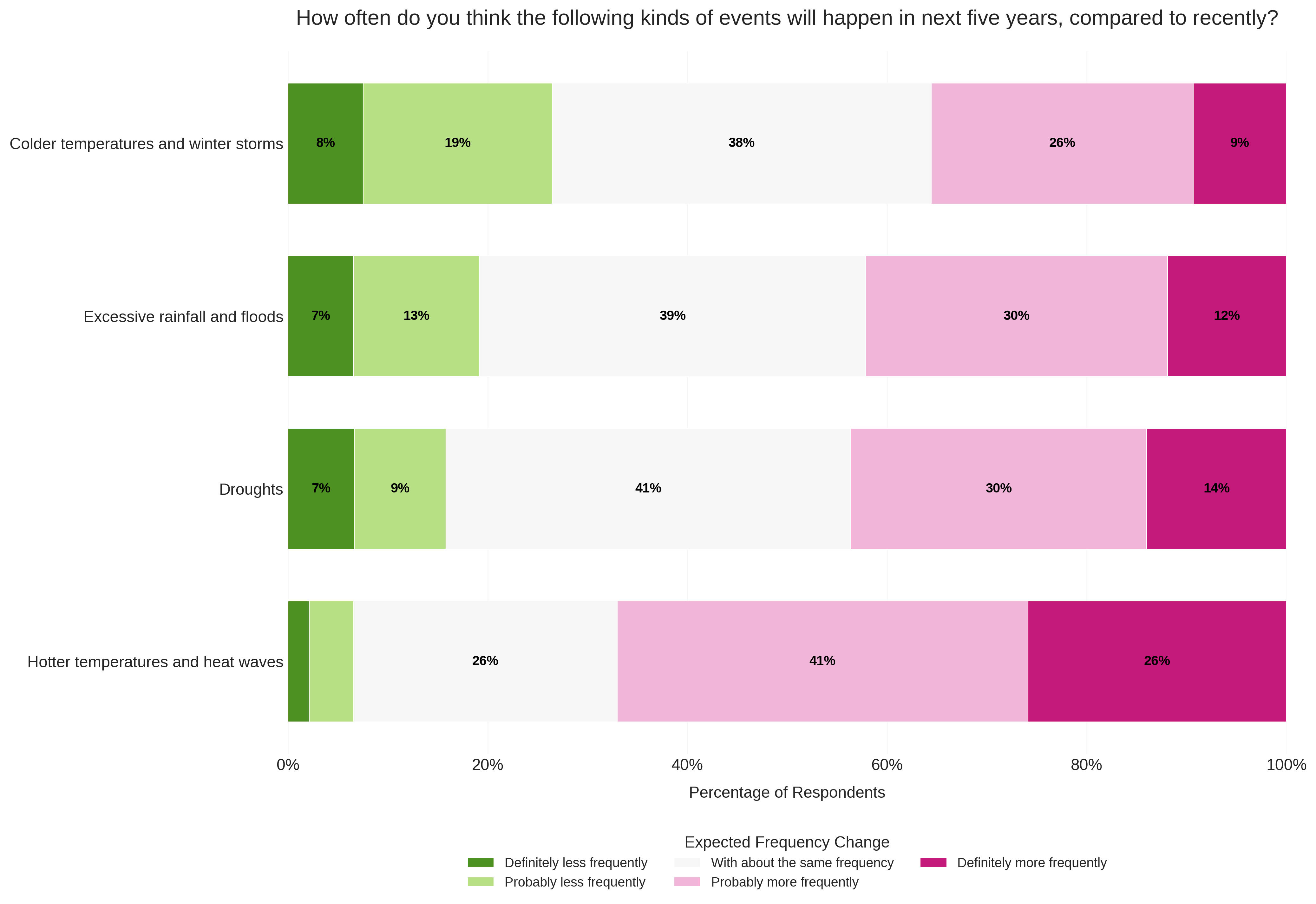
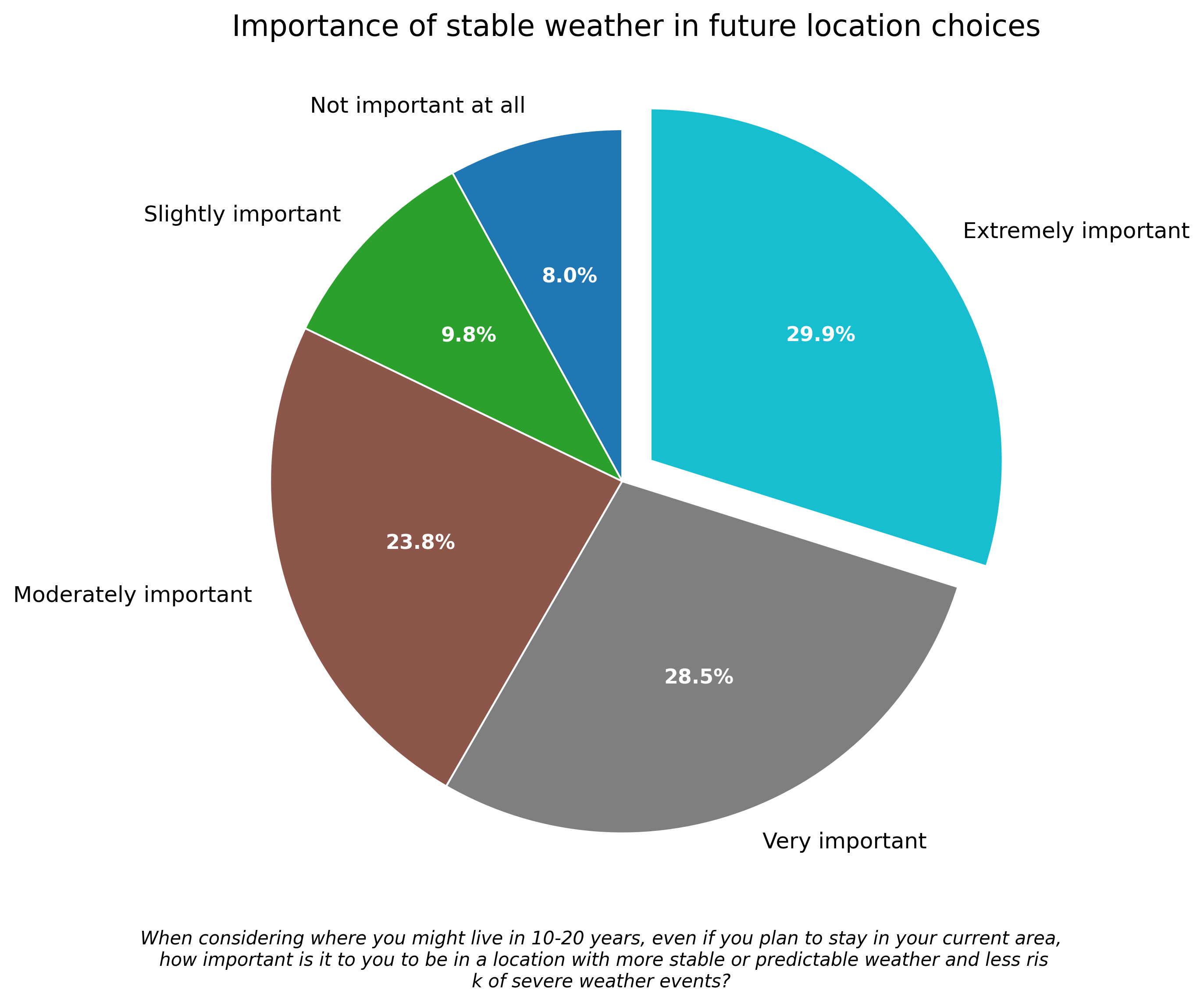
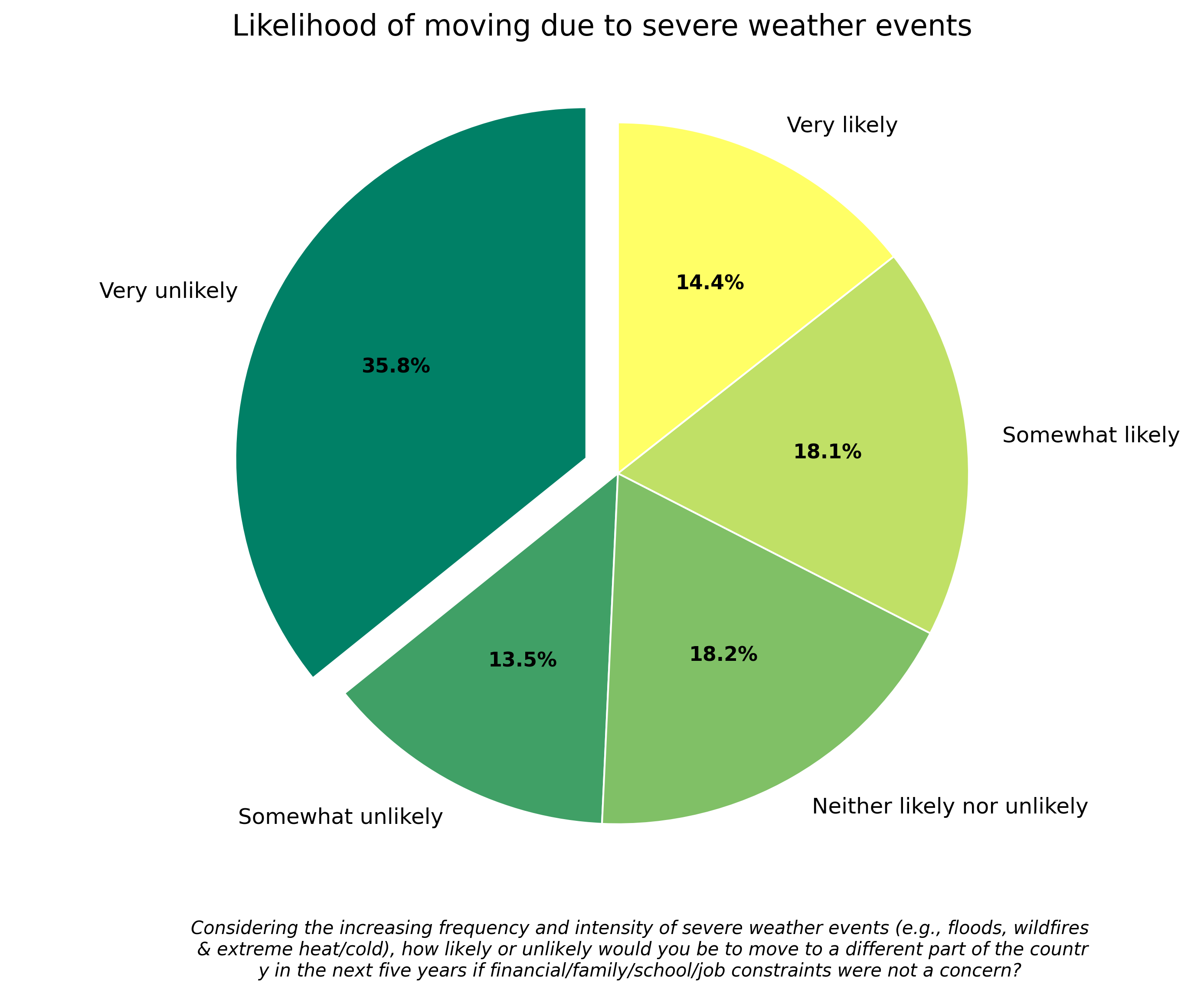
Americans Display Mixed Support for Carbon Capture when Earthquake Risks
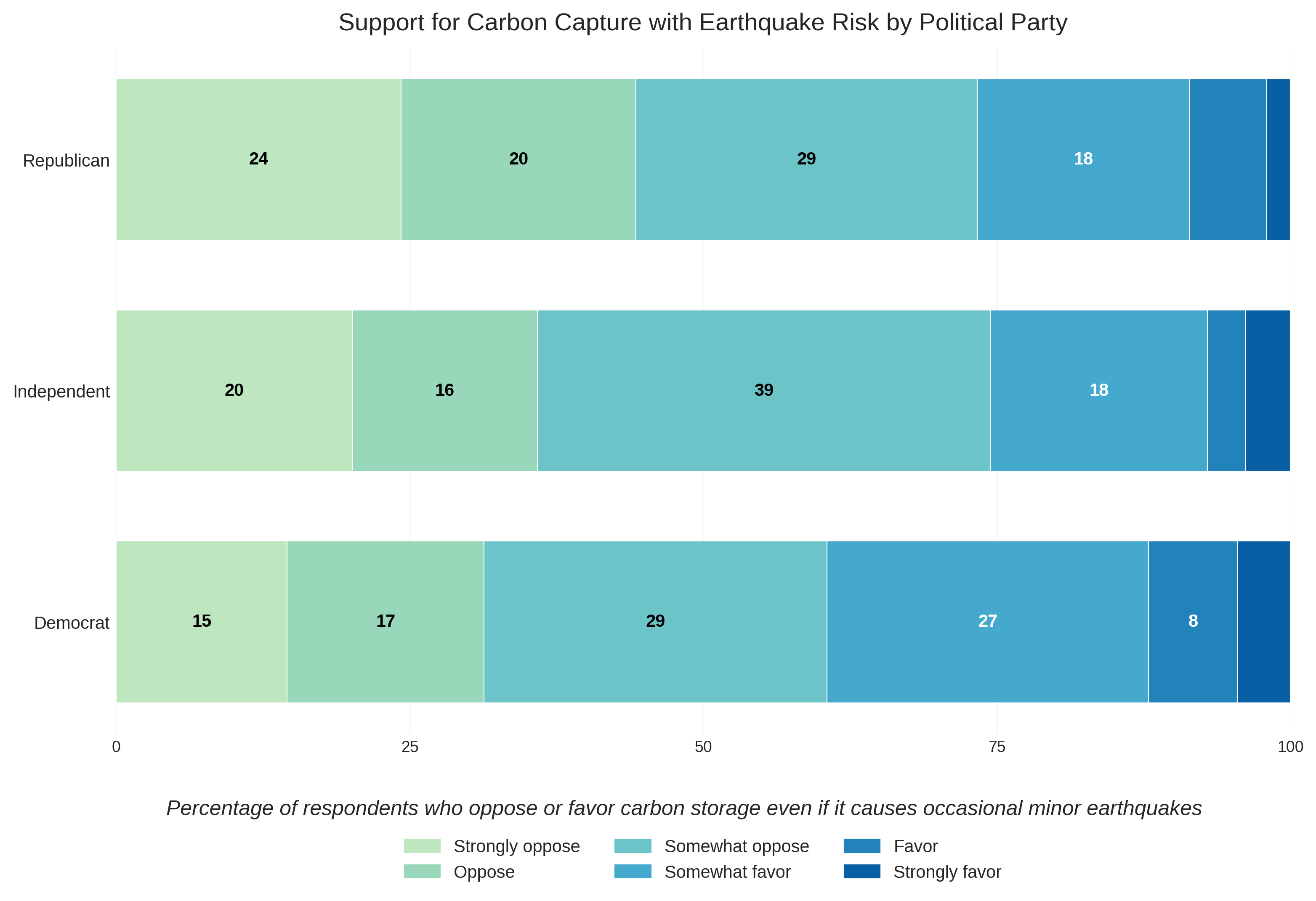
A recent 2024 SPEER survey reveals varied public attitudes toward carbon capture technology when weighed against potential seismic risks. Across demographic categories, approximately one-third of Americans somewhat oppose carbon storage that might cause occasional minor earthquakes, while support levels differ significantly along political, generational, and geographic lines.
Democrats show stronger support for carbon capture (35% either favor or strongly favor) compared to Republicans (27%), despite earthquake concerns. Younger generations appear more receptive to the technology, with Gen Z showing the highest combined support (36% either somewhat favor, favor, or strongly favor) versus 33% among Boomers.
Education level also influences attitudes, with college graduates more likely to favor carbon capture (36% combined favorable responses) than those without degrees (31%). Regional differences are notable, with Northeast residents expressing greater support (34%) than those in the South (30%).
Religious affiliation appears to play a modest role, with Evangelicals showing somewhat higher opposition (48% either strongly oppose or oppose) than those without religious affiliation (36%).
These findings come as policymakers continue debating the role of carbon capture technologies in addressing climate change while balancing public safety concerns.
How Democrats and Republicans View "Elites" Differently
A new analysis of SPEER 2024 survey responses reveals significant differences in how Democrats and Republicans conceptualize "elites" in American society, potentially shedding light on deepening partisan divides.
When asked what immediately comes to mind upon hearing the word "elites," both groups frequently mentioned wealth and power. However, Democrats (55%) were substantially more likely than Republicans (39%) to focus on economic aspects, often referencing business figures like Trump, Musk, and Bezos.
Meanwhile, Republicans more frequently emphasized political power and control, with 13% mentioning politicians compared to just 7% of Democrats. Republican respondents specifically named figures like Soros, Obama, and the Clintons, while some explicitly identified "elites" as Democrats.
The results suggest that when politicians speak about 'elites,' they may be invoking entirely different mental images depending on their audience's political affiliation. Responses also revealed differing narratives: Democrats typically described elites as disconnected from ordinary people's economic realities, while Republicans more often characterized them as rule-makers who don't follow their own rules.
The findings may help explain why anti-elite messaging resonates differently across political lines, with each group perceiving a different "elite" threat to American society.
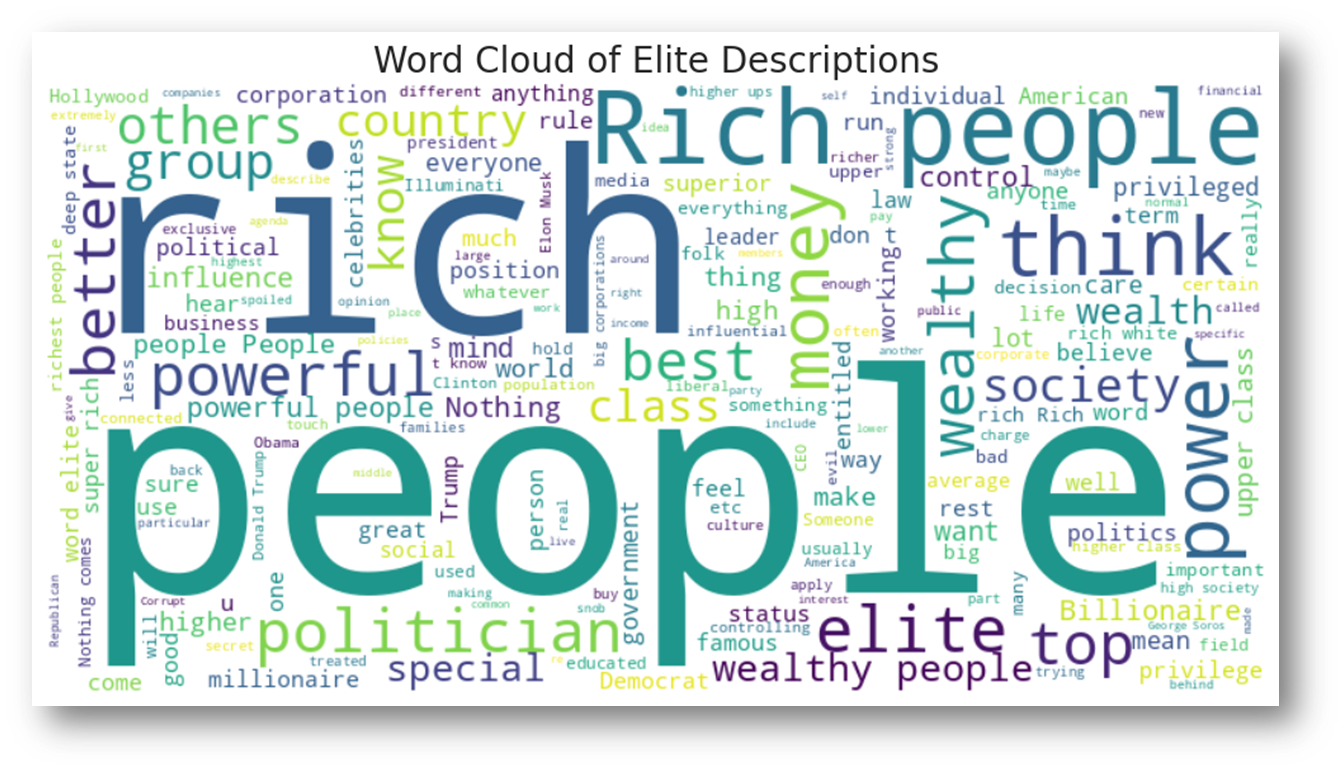
Who is on the “dark side” - Democrats or Republicans?

Can modern politics be interpreted through the lens of popular media? Our research group wondered if people saw their own party in media that follows a storyline of good vs. evil. In our SPEER 24 survey, we asked respondents if they thought Democrats or Republicans were more like the “light/dark” side from Star Wars. A majority (54.5%) of respondents picked a side while about 17% said they are both like the dark side, and roughly 3% said they’re both like the light side. Only one-fourth of Americans in our survey said American politics should not be compared to Star Wars.
A breakdown by partisans reveals differences. Democrats were more likely to see their party as the light side (61.5%) compared to Republicans (47.3%). Republicans were twice as likely as Democrats to see both parties as the dark side (20% vs. 10%). A plurality of those who are politically independent or from another party (42.9%) said politics and Star Wars are not comparable. Around 39% of independents said both parties are the dark side. When independents did pick a side, they were slightly more likely to say Democrats are the light side and Republicans are the dark side.
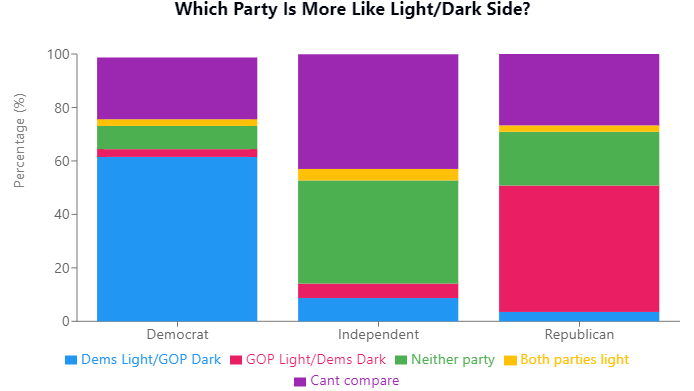
Carbon Capture and Storage: How Moral Values Shape Public Opinion
The SPEER 2023 survey revealed fascinating insights into how people's moral values influence their support for carbon capture and storage (CCS) technology, particularly when considering potential earthquake risks. In a nationally representative survey of Americans conducted in 2023, researchers found that our fundamental moral beliefs play a crucial role in shaping attitudes toward this climate change solution.
The study focused on five core moral foundations: Care (concern for others), Fairness (justice and equity), Loyalty (group commitment), Authority (respect for tradition and leadership), and Purity (sanctity and naturalness). Interestingly, people who scored high on Care and Loyalty were more likely to support CCS despite potential earthquake risks, while those emphasizing Fairness, Authority, and Purity tended to oppose it.
One of the most striking findings was how political views interacted with these moral foundations. Liberals with strong group loyalty showed increasing support for CCS despite earthquake risks, viewing it as part of a collective effort to combat climate change. Conservatives' support remained relatively unchanged regardless of their loyalty scores, suggesting that different moral frameworks guide their assessment of the technology's risks and benefits.
The implications are significant for how we communicate about climate solutions. Rather than focusing solely on technical details, successful public engagement might need to address underlying moral concerns. For instance, messaging could emphasize how CCS demonstrates care for future generations while acknowledging concerns about fairness in risk distribution and respect for natural systems.
These findings come at a crucial time as communities grapple with implementing climate solutions that carry potential risks. Understanding the moral foundations of public support or opposition could help design more effective and inclusive climate policies that resonate across different value systems.
Want to learn more? Please see the full research report.

Understanding How Americans Think About Renewable Energy
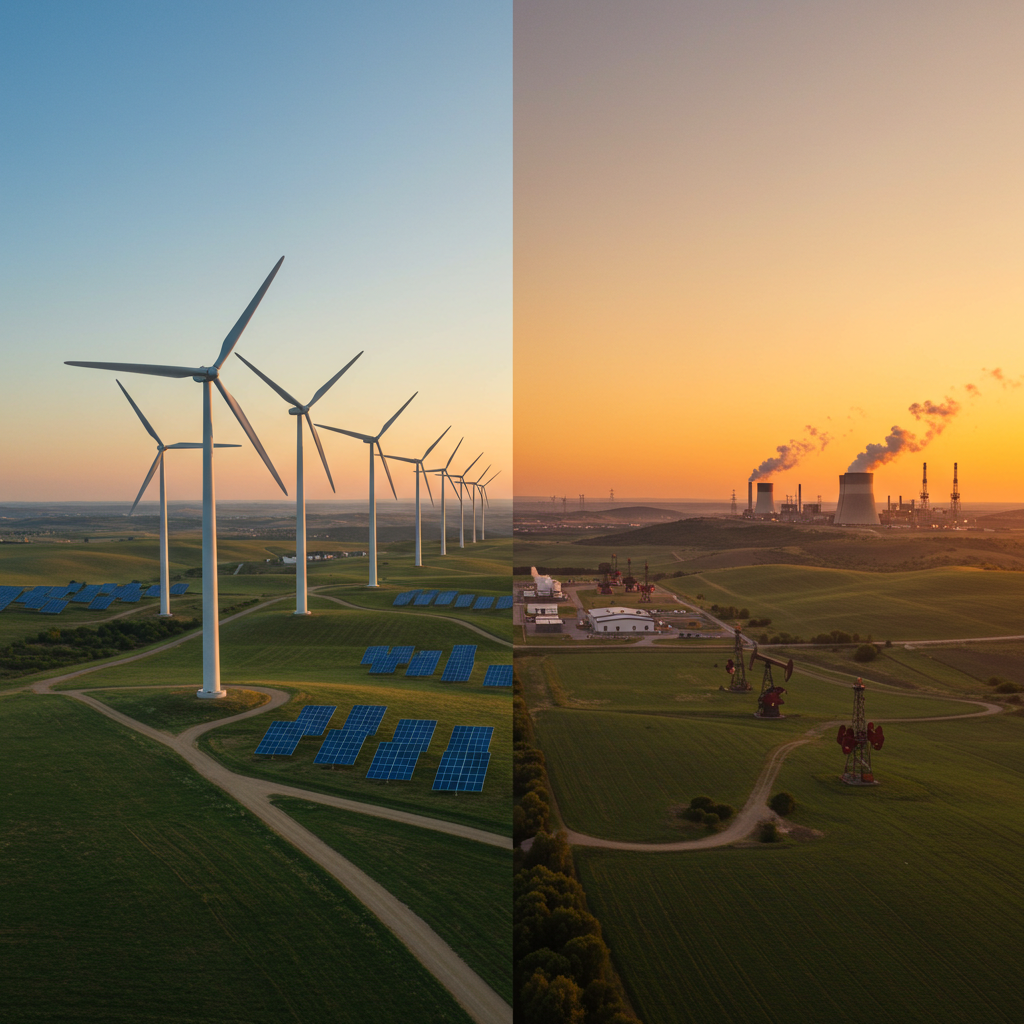
When looking into energy expansion, and alternative energies to add to our mix, its important to think about connections between cultural values and energy preferences... and looking beyond traditional factors like politics and economics. This SPEER research examines how different views about nature and society influence public support for various energy sources.
Based on a survey of over 2,000 Americans, the research identifies distinct patterns in how cultural worldviews shape energy preferences. People who see nature as delicate and requiring protection typically show strong support for renewable energy sources. Meanwhile, those who view nature as inherently resilient often prefer maintaining current energy systems. The study also found that people who value traditional social structures tend to oppose reducing fossil fuel use, while showing no strong preferences about renewable energy.
These cultural beliefs often prove more influential than conventional demographic factors like age, education, or income. When people hold strong beliefs about environmental protection and equality, their support for wind energy increases by over 22%. Similar patterns emerge for solar energy, with cultural values significantly affecting support levels.
The research also revealed notable regional variations across the United States. Different areas of the country show varying levels of support for renewable energy and fossil fuel reduction, reflecting complex interactions between local cultures, economic interests, and existing energy infrastructure.
These findings suggest that effective energy policy discussions need to consider how cultural values shape public preferences. Understanding these deeper influences could help communities develop energy solutions that better align with local values and perspectives.
For more information about this research, please see our full report.
Public Trust in Water Recycling: Understanding What Shapes Support and Skepticism
As water scarcity becomes an increasingly pressing challenge, understanding what drives public trust in water recycling initiatives is crucial. A new SPEER study reveals how various factors, from demographics to moral values, influence Americans' acceptance of recycled water solutions.
The nationwide survey of over 2,000 adults found that trust in water recycling varies significantly by location and background. Higher-income individuals and suburban residents generally show more trust in these initiatives, while rural residents and women tend to be more skeptical. Personal well-being also plays a role - people reporting better health and happiness express greater confidence in water recycling programs.
The study uncovered interesting connections between social factors and trust levels. People with strong community ties and social networks are more likely to support water recycling initiatives. However, those who believe in conspiracy theories show significantly lower trust in water authorities managing these projects.
Moral values emerged as key factors shaping attitudes. People who prioritize group loyalty tend to express more trust in water recycling programs, while those with strong concerns about purity show more skepticism. Trust in climate scientists also predicts greater confidence in water recycling initiatives, though general climate change beliefs had less impact than expected.
These findings suggest that building public support for water recycling requires understanding and addressing multiple factors - from addressing practical concerns to considering how initiatives align with community values. As regions face growing water challenges, this research provides valuable insights for developing more effective approaches to sustainable water management.
The full report and all the details are here.
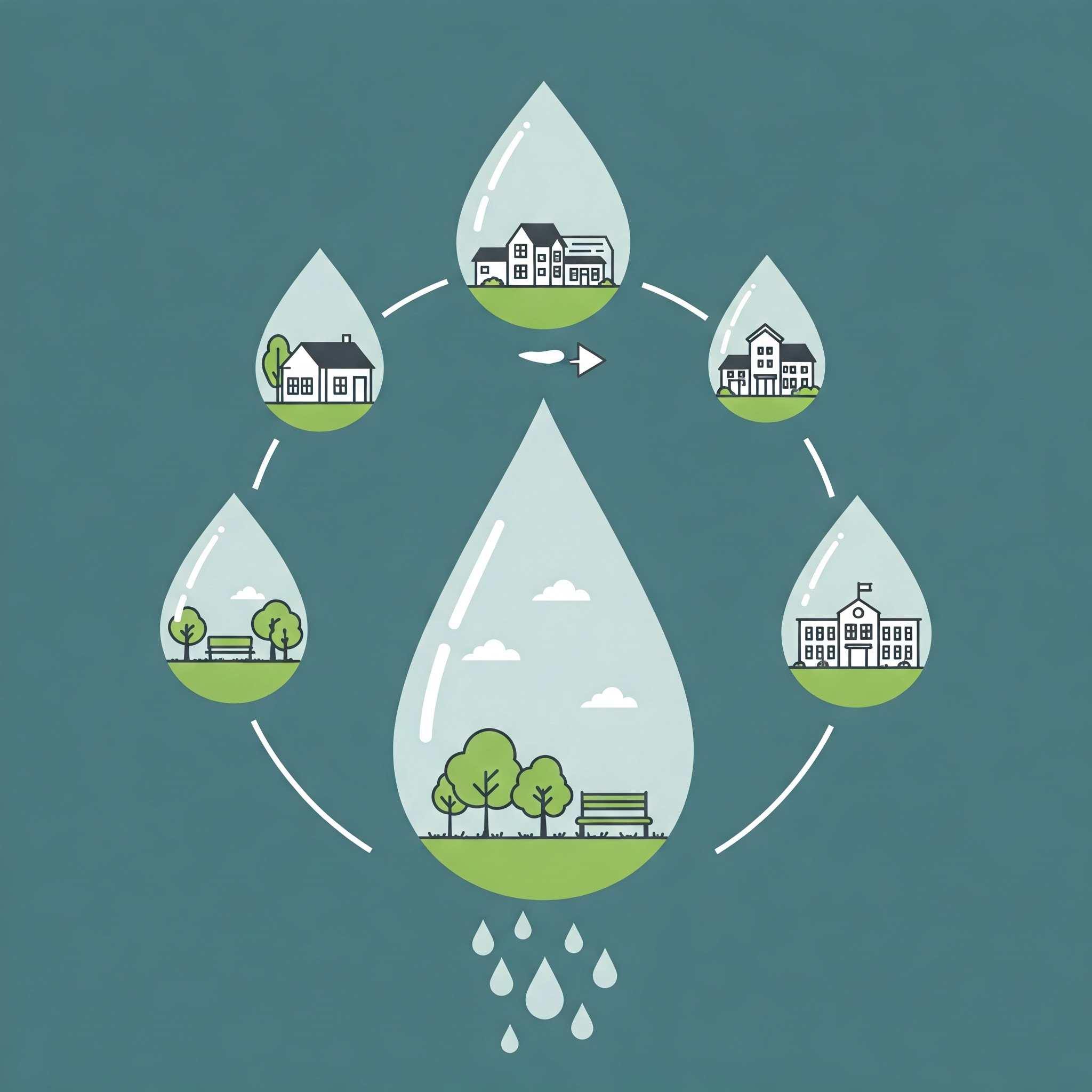
Understanding Group Attitudes in America: A 2023 Survey Analysis

Political views strongly predict how Americans feel about different social and political groups, but new research reveals a more complex picture shaped by age, education, religion, and geography. Drawing on survey data from over 2,000 adults, researchers found that younger Americans generally expressed warmer feelings toward traditionally left-leaning groups, while rural residents and those with strong religious affiliations showed more positive attitudes toward right-leaning groups.
The study examined attitudes toward various groups, from political organizations to religious communities, using a "feeling thermometer" approach where participants rated groups from 0 to 100. Education levels emerged as significant, with higher education correlating with more positive views of some groups, particularly scientists and journalists. Family structure also proved influential, with parents of young children showing distinct patterns in their group assessments.
Geographic location added another layer of complexity to the findings. While regional differences were less pronounced than might be expected, urban-rural divides were notable. The research also found that religious participation and beliefs were strong predictors of attitudes toward various groups, often independent of political affiliation.
The survey revealed particularly interesting patterns regarding trust in institutions and expertise. Climate scientists received relatively high ratings across most demographic groups, though with some ideological variation. Similarly, attitudes toward police and the oil and gas industry showed strong geographic patterns, with rural residents expressing more positive views than urban dwellers.
Perhaps most striking was the role of age in shaping attitudes. Younger generations consistently showed more openness to diverse groups and perspectives, while older Americans tended to express stronger in-group preferences. These generational differences persisted even when controlling for other factors like political ideology and education level.
These findings provide valuable insights into America's social landscape and suggest that while political polarization is real, the factors shaping how Americans view different groups are more nuanced than often portrayed in public discourse.
Full report and many graphs are here!
Understanding Renewable Energy Support Through Moral Values
SPEER research at the University of Oklahoma reveals how our moral foundations shape our views on renewable energy and fossil fuels, going beyond traditional political divides. The research, based on a survey of over 2,000 Americans, explores how different moral values influence support for energy policies.
The study finds that people who strongly value care and fairness are more likely to support renewable energy and reducing fossil fuel use, regardless of their political affiliation. Those who emphasize values related to authority and loyalty tend to be more hesitant about energy transitions, particularly when it comes to reducing fossil fuel usage. This suggests that our deeper moral values, not just our political leanings, play a crucial role in how we think about energy choices.
These findings have important implications for how we approach energy policy discussions. Rather than focusing solely on political or economic arguments, the research suggests that addressing underlying moral concerns could help build broader support for energy initiatives. For example, policies that acknowledge both environmental protection and economic stability might resonate with people across different value systems.
The research also found significant regional variations in energy preferences across the United States, highlighting the importance of tailoring energy transition strategies to local values and concerns. This understanding could help communities develop more effective and widely-supported approaches to energy policy.
This study provides valuable insights for policymakers, environmental advocates, and energy industry stakeholders working to navigate the complex social dynamics of energy transition in the United States. By understanding how different moral values influence energy preferences, leaders may be better equipped to develop policies and communication strategies that resonate with diverse perspectives.
Read the full research report here.

Mapping Americans' Views on Climate Change
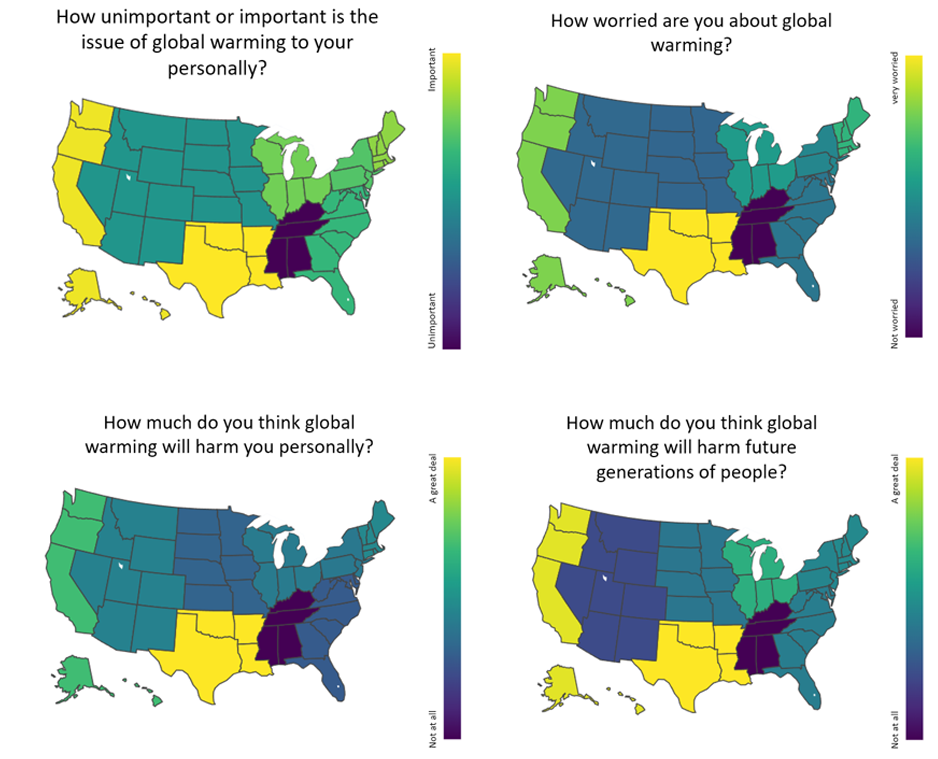
Regional differences in climate attitudes emerged as a striking pattern in SPEER's national survey of over 2,000 U.S. adults. While the Pacific region shows high trust in climate scientists and strong climate change concern, the West South-Central region (Texas, Oklahoma, Arkansas, and Louisiana) also demonstrated notably high levels of climate concern – a surprising finding given the region's economic ties to fossil fuels. In contrast, the East South-Central region (Kentucky, Tennessee, Mississippi, and Alabama) consistently showed the lowest levels of climate change concern and trust in climate scientists.
The study found that political orientation remains strongly linked to climate attitudes, with conservatives and Republicans generally expressing more skepticism about climate change than liberals and Democrats. However, education level and religious beliefs also play important roles. Higher education levels correlate with stronger climate change beliefs, while evangelical Christians and biblical literalists tend to express more skepticism.
Trust in climate scientists was generally high across the U.S., though with notable variations among different groups. Women and those with higher education levels showed greater trust in climate scientists, while certain demographic groups, including Black and Hispanic respondents, demonstrated lower trust levels.
These findings establish an important baseline for understanding how Americans think about climate change. As the first in a planned series of annual surveys, this research will help track how public attitudes evolve over time and inform strategies for more effective climate communication across different regions and communities.
The full report can be read here.